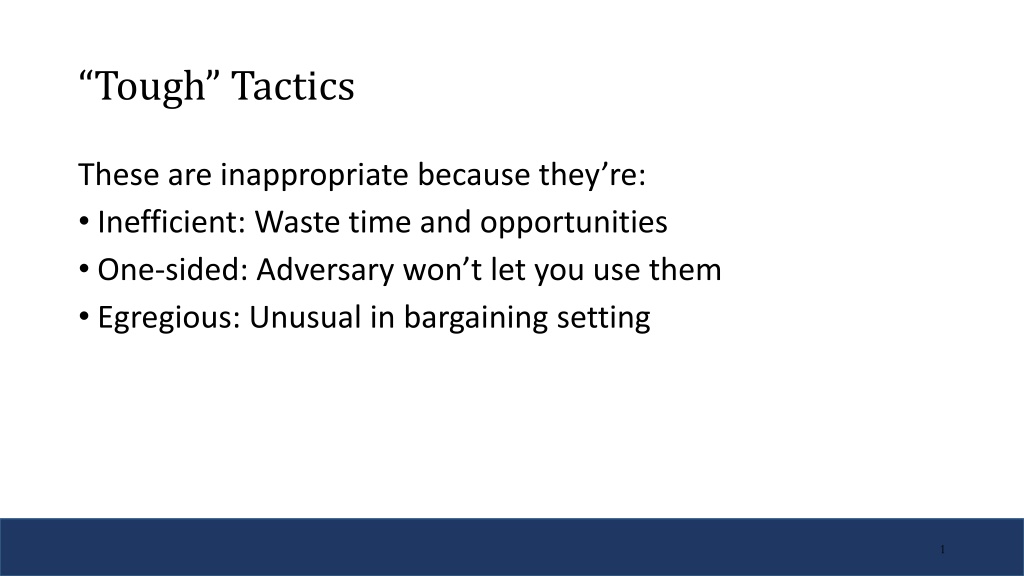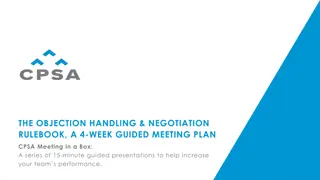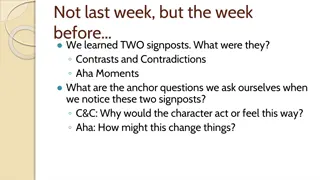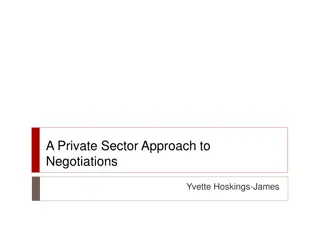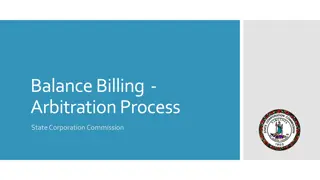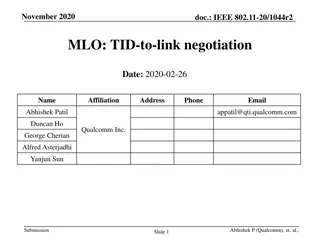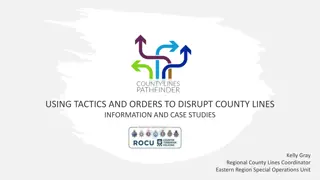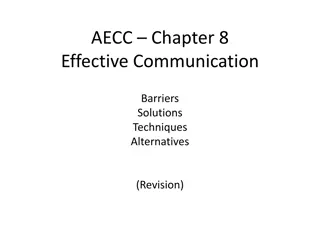Effective Strategies for Overcoming Tough Negotiation Tactics
In negotiation settings, encountering tough tactics is inevitable. However, reacting impulsively or engaging in tit-for-tat responses can be counterproductive. This resource provides insights and alternatives to handling inappropriate tactics such as stonewalling and reneging, emphasizing maintaining composure, analyzing the situation, and implementing controlled responses. By focusing on reform rather than retaliation and building trust through effective communication, negotiators can navigate challenging situations successfully.
Download Presentation

Please find below an Image/Link to download the presentation.
The content on the website is provided AS IS for your information and personal use only. It may not be sold, licensed, or shared on other websites without obtaining consent from the author. Download presentation by click this link. If you encounter any issues during the download, it is possible that the publisher has removed the file from their server.
E N D
Presentation Transcript
Tough Tactics These are inappropriate because they re: Inefficient: Waste time and opportunities One-sided: Adversary won t let you use them Egregious: Unusual in bargaining setting 1
Common Responses Accept the tactic (but this makes you and/or client angry, and encourages them to use it) Retaliate with a similar tactic (and risk starting a war?) Walk away (and lose the value you are seeking from a deal) 2
Alternative Strategies Don t react immediately; instead distance yourself: Go to the balcony, if only for a few seconds Analyze the situation: Why are they doing this? Work to reform, rather than punish Negotiate process rules directly Retaliate if necessary, but in a controlled way 3
Stonewalling Options for Responding Stay calm: It s usually not personal a tactic or hidden reason Ignore it Keep negotiating Ask: Why? Ask: How to justify to my client? Reframe it as a wish, not requirement Argue: Why is it fair? (principles) Add interests: What else can we discuss? Change the mix (adjourn, add people) Test: Say you can t accept it 4
If you have to stonewall Avoid making it personal You ve been in the same situation yourself It s the unusual circumstances You think it s in fact a fair outcome Blame someone else: client, etc. Deflect attention Add terms (if valuable, no longer stonewall) Provide a fig leaf 5
Options in response to reneging: Confront Confirm that you had a (tentative) deal Say no change won t work Cite principle Cite your client Demand equal treatment: Same right to retract; Note inefficiency of this Retaliate Retract a term yourself but if you do, explain why 6
Options: Accommodate or bargain Accept the change --if you get new terms too Accept if there is a guaranteed deal Insist that they make binding offer Or demand a binding yes-or-no Keep a concession in reserve for nibble But reneging can still hurt. To avoid, Build a relationship Test trustworthiness Clarify when deals set 7
If your side has to renege Have a reason Plausible if possible: unexpected development, misunderstanding re implications, But almost anything is better than nothing Re-characterize so it s not a renege Apologize profusely: difficult client, etc. Offer something new (need not be equal) Commit to no more surprises 8
